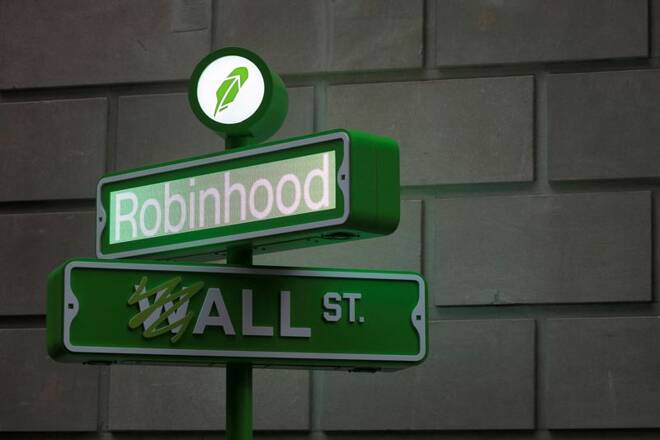Advertisement
Advertisement
Robinhood must face U.S. market manipulation claims over ‘meme stock’ rally, judge rules
By:
(Reuters) - Stock trading platform Robinhood Markets Inc must face market manipulation claims over restrictions it placed on trading during last year's "meme stock" rally, a U.S. judge has ruled.
By Jody Godoy and Hannah Lang
(Reuters) -Stock trading platform Robinhood Markets Inc must face market manipulation claims over restrictions it placed on trading during last year’s “meme stock” rally, a U.S. judge ruled on Thursday.
U.S. District Court Judge Cecilia Altonaga in Miami said in the ruling that investors in GameStop Corp, AMC Entertainment Holdings Inc and seven other stocks can proceed with a proposed class action lawsuit alleging the restrictions artificially depressed share prices.
The lawsuit was one of several cases brought against the retail trading platform after it temporarily barred customers from buying certain hot stocks in January 2021, including GameStop and AMC.
Shares of those companies surged to extreme highs thanks to a social media-fueled rally that eventually led Robinhood and others to restrict trading in the affected securities, infuriating retail investors and rattling market confidence. The volatility caused major losses for hedge funds that had bet against the meme stocks.
Robinhood had removed its users’ ability to buy certain stocks for a day when its clearinghouse requirements ballooned to a $3 billion demand for cash – an obligation set by the National Securities Clearing Corporation. The brokerage also temporarily limited the number of shares users could buy in some hot stocks.
Judge Altonaga oversees a sprawling set of lawsuits alleging Robinhood and others violated U.S. laws in their response to the social media-driven rally.
She previously dismissed claims that the company and other brokerages illegally conspired to halt a “short squeeze” that was causing billions of dollars of losses for hedge funds that were betting on falling stock prices. The judge also dismissed retail investors’ claims that Robinhood was negligent and breached its duty to customers.
In the ruling published Thursday, the judge denied Robinhood’s motion to dismiss separate allegations that it engaged in market manipulation to artificially depress the prices of the nine stocks by canceling purchase orders, liquidating its customers’ shares and closing out options.
While the restrictions alone would not support a claim of market manipulation, together with “opaque and conflicting statements made to hide its lack of capital” they “evince an intent on the part of Robinhood to artificially depress share prices for its personal benefit,” the judge wrote.
The company must also face the traders’ claim that the alleged manipulation violated a federal statute prohibiting securities fraud, the ruling said.
The judge however dismissed a claim that the brokerage engaged in market manipulation to induce investors to sell their shares.
In a statement, Robinhood’s associate general counsel of litigation and regulatory enforcement, Cheryl Crumpton, said the company continues to stand by its actions, which it believes were “appropriate and necessary to support our customers.”
“The court has not yet made any findings of fact or ruled on the merits — and we will continue to vigorously defend ourselves in this matter,” Crumpton said.
(Reporting by Jody Godoy in New York and Hannah Lang in Washington; editing by Jonathan Oatis, Leslie Adler and Aurora Ellis)
About the Author
Reuterscontributor
Reuters, the news and media division of Thomson Reuters, is the world’s largest international multimedia news provider reaching more than one billion people every day. Reuters provides trusted business, financial, national, and international news to professionals via Thomson Reuters desktops, the world's media organizations, and directly to consumers at Reuters.com and via Reuters TV. Learn more about Thomson Reuters products:
Latest news and analysis
Advertisement
